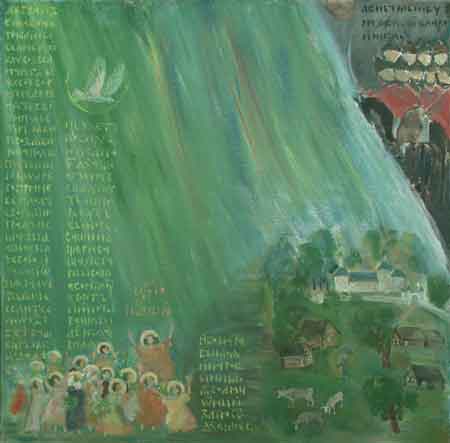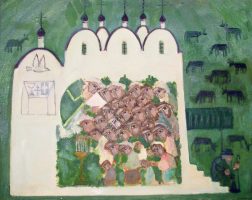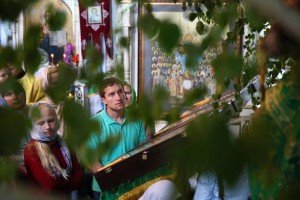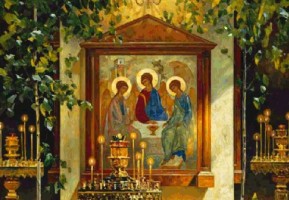“Orthodoxy, sister, is when you want one thing, but do another. You want to talk, but you remain silent. You want to sleep, but you don’t. You want to eat, but you don’t – especially candies. And you mayn’t watch TV: it’s from the Beast.”
Thus did a convent worker lecture an elderly pilgrim. And the latter stood and listened with her mouth open. I walked past and thought: “But she’s right. Faith for many is labor, torture, temptation, and boredom. Christ is strong, but not a favorite.
At the end of Confession, I often ask what I think is the most important thing:
“Do you love Christ?”
But other priests say that this is indecent. And one deacon even added:
“There are certain things that one doesn’t even tell a priest at Confession!”
We are ashamed of loving and it’s indecent to speak about love. To talk about who stole, killed, lied is decent, but about this – no. Without the positive. Maybe the word “to love” is just scary? After all, to repent is to set out like Cain. It’s a look into the past. The word “to love” is addressed to the future. It is very important for the Russian person. They don’t rush into it. To say “I love you” is to take on the life and fate of the beloved. To say “I love you” to God means, like with one’s head in the pool, to live wide open, loving God, people, and beasts. And it’s scary. And unprofitable.
Why did the Apostles disperse across the face of the earth to certain death and torture? Was it because they, like the old lady put it, felt compelled to do what they didn’t like doing? Were they masochists, and enjoyed suffering? No!
From the Acts of the Apostles:
“And they were all amazed, and were in doubt, saying one to another, ‘What meaneth this?’ Others mocking said, ‘These men are full of new wine.’ But Peter, standing up with the eleven, lifted up his voice, and said unto them, ‘Ye men of Judea, and all ye that dwell at Jerusalem, be this known unto you, and hearken to my words: for these are not drunken, as ye suppose, seeing it is but the third hour of the day. But this is that which was spoken by the prophet Joel. ‘And it shall come to pass in the last days,’ saith God, ‘I will pout out of my Spirit upon all flesh: and your sons and your daughters shall prophesy, and your young men shall see visions, and your old men shall dream dreams: and on my servants and on my handmaidens I will pour out in those days of my Spirit, and they shall prophecy: and I will show wonders in heaven above, and signs in the earth beneath: blood, and fire, and vapour of smoke. The sun shall be turned into darkness, and the moon into blood, before that great and notable day of the Lord come. And it shall come to pass that whosoever shall call on the name of the Lord shall be saved’” (Acts 2:12-21).
Why were they as though drunk? Wine is the crutch of joy. And joy itself came into them. This joy was an unprecedented force. This force of joy shook them. They went to the ends of the earth with this voice of joy, having only one goal: to multiply and share it. It had to be shared. It crushes the soul when it affects only one person, but is multiplied when shared.
It was about this joy of love that Christ spoke to the Samaritan woman:
From the Gospel:
“Jesus answered and said unto her, ‘Whosoever drinketh of this water shall thirst again: but whosoever drinketh of the water that I shall give him shall never thirst: but the water that I shall give him shall be in him a well of water springing up into everlasting life” (John 4:13-14).
He has in mind that rivers of living water will flow from our hearts, which will fill both our hearts and those of our neighbors.
Have they flowed as such? Is it true that from our hearts flows so much happiness that we simply need to share the excess?
It’s not true. We are eternally dissatisfied with ourselves, our family, and our work. Condemning friends is our favorite thing to do. Prophesying about the fate of the government and the world is our favorite negative attribute. We can be easily recognized because most of us are hidden psychos.
I sometimes feel very sorry for children baptized in infancy. They do not know how the Holy Spirit comes in rough breathing and fills the heart with the wine of love. The gifts will remain, but it won’t be this day that the Apostles experienced. Because the godparents pretend to teach the Creed, and the parents believe they are Christians. I bring boys after Baptism into the altar and I say to them:
“Well, brother, this is great! I’d like to know what your soul sees in the altar. Maybe the heavenly powers, and perhaps Christ Himself. It’s a pity you’ll forget all this. But I say to your soul and to your guardian angel: Christ is Risen!”
I think that our guardian angels smile.
“If there is no joy in our heart,” says St. John of Kronstadt, “that means the devil lays there.” In Baptism we received all the treasures of eternal peace. Thanks to the gifts of the Holy Spirit, anyone can become a King and Prophet. Any boy can become a priest and receive through the laying on of hands the grace that has been transmitted without interruption from the Apostles themselves. What more is there? Do we need the heavens to open and the angels to proceed with trumpets? Or would that be too much?
If in Old Testament times only the elect of God received anointing, such as the young David or Moses, now every Christian receives just as much grace. There is no measure to the Spirit. It cannot be greater or lesser. It cannot be one hundred grams or the Universe. It is infinite in every drop. And every one of us, receiving in anointing the gifts of the Holy Spirit, receives as much as our soul can contain. We can take more than we know how.
It’s good if we don’t know how. Otherwise we’ll throw it in the dust. How so? How can we be unhappy, joyless, and dull, if we have received the Spirit? Have we not just pushed Him further away? Is it a problem in the Spirit? No. The Spirit is in us, in our hearts. The heart is dry and dirty, and does not only not receive the gifts of the Spirit, but is afraid of them and runs away from them.
The Apostle Paul said the following words: “Well spake the Holy Spirit by Esaias the prophet unto our fathers, Saying, God unto this people, and say, Hearing ye shall hear, and shall not understand; and seeing ye shall see, and not perceive: For the heart of this people is waxed gross, and their ears are dull of hearing, and their eyes have they closed; lest they should see with their eyes, and hear with their ears, and understand with their heart, and should be converted, and I should heal them” (Acts 28:25-27).
My friend rends an apartment to students. The students are students. They live by clubbing. He asked them:
“Where are you going for vacation? To houses?”
“No.”
“To the Crimea?”
“No.”
“Where?”
“To Yaroslavl.”
“What’s there?”
“An old age home. We already have been going there for years.”
“!!!!!”
“Yes, they aren’t going to Yaroslavl, they are going to God.”
They don’t look Orthodox. The girls don’t wear long blue skirts or scarves. The boys don’t have beards and black shirts. They don’t have Jerusalem crosses on their chests or iconstasis of amulets and medallions, but they know this joy that the came into the world thanks to God and the Apostles. They have received this wine of love. They have fallen in love with God. They have learned that joy, and not parted with it.
What took place in the upper room in Mount Sion with the Apostles was of universal significance. They were not just receivers of the Holy Spirit or mediums. They became witnesses of the fact that God had renewed human nature. People were before undeveloped and saved themselves in the community and people, by the power of the whole people. Thus is was simpler to simply save themselves than to personally serve God. There was less personal empowerment, less personal achievement.
But a reformatting of human nature took place, an updating of the program and “iron.” That which was once given as a great gift to the elect – the Prophets Elias, David, Abraham – for the sake of the people, is not given to every Christian personally. To anyone, if only he wants to receive it.
On Pentecost took place an event on a universal scale not for a separate nation, but for anyone loving God, and human nature was changed. God put people in front of the doors of Paradise different than they were before Christ. And this gift is especially great in the Orthodox Church, where not only priests, but all laymen are given the Body and Blood of Christ. What confidence!
But does living water flow from our hearts? Do we speak like Apostles about Christ to those people we’re living with? Or are we, as the Muslims call us, “people of the book”: who read, remain silent, and buy candles?
Have we received the gifts of the Holy Spirit and known the wine of joy? Or are we moaning and groaning all the time? If the former, then the Feast of Pentecost is our feast. It is the feast of the Apostles, of these Muscovite students living in the apartment, of Christians living to the full extent for the sake of Christ and his fellow man.
Perhaps death is still far from us. But what is death? It’s empty: we close our eyes and a moment later open the eyes of our soul. And God will say:
“I gave you festive clothing. Where is it? How did you come to the marriage feast in clothes stained with anger, greed, lust, hypocrisy, murder, and stealing? Why did you break it? Why did you throw it away?”
It’s not because he’s sorry about the gifts. It’s because of our happiness. These are not just gifts: his very Son was offered as sacrifice. Because He loves. And the feast of Pentecost is the feast of His love for us, gentle and deep.
Translated from the Russian


















